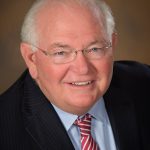When Florida lawmakers debated HB 1 earlier this year, the discussion largely focused on how the legislation would dramatically expand education choice through universal eligibility and flexible spending options for families.
Another part of the bill inspired far less discussion but got the attention of school district leaders across the state: a review of public school regulations.
By Nov. 1, the state Board of Education must develop and recommend “potential repeals and revisions” to the state’s education code “to reduce regulation of public schools.”
“This is a great step towards keeping our public schools competitive” in an era of expanded options, said Bill Montford, a former Democratic state Senator from North Florida who heads the Florida Association of District School Superintendents.
“Traditional, neighborhood public schools have been, and will continue to be, the backbone of our K12 education system,” he

said. “We want our schools to be the first choice for parents, not the default choice, and to do that we need to reduce some of the outdated, unnecessary, and quite frankly, burdensome regulations that public schools have to abide by,”
Before they propose any changes, state board members must consider feedback from a diverse group that includes teachers, superintendents, administrators, school boards, public and private post-secondary institutions and home educators.
To fulfill that requirement, board members set up a survey link that will accept suggestions through today. A group of superintendents submitted a recommendation list that covers topics that include construction costs, budgets, enrollment, school choice, instructional delivery and accountability. Their pitches included proposals to:
- Eliminate the need to provide a seat for every student residing within the district, due to the passage of universal eligibility for education choice programs, which are expected to reduce the number of students attending district-run schools.
- Create “transfer windows” for students who switch from private or home school to public school so school districts can minimize disruptions in the middle of the school year.
- Provide school districts with blanket flexibility comparable to charter schools, which are exempt from entire swaths of state education laws.
“We’d like for them to recognize all parental choice equally and give school districts the same flexibility and opportunity to innovate provided to other publicly funded options,” said Brian Moore, general counsel for the superintendents association that Montford leads. He added that the superintendents would like to see more cooperation between school districts and the Department of Education.
This effort isn’t the first the state has made to provide school districts with relief from what they see as burdensome regulations. But to some leaders the process seems more like a game of Whac-A-Mole, with new regulations soon replacing the ones that get repealed.
Ten years ago, Gov. Rick Scott signed SB 1096, which repealed some regulations based on the recommendations of a group of superintendents, including Montford. The bill repealed a requirement approved in 2010 that all public schools and universities gather and report statistics showing how much material each had recycled during the year. It also ended a 2002 requirement that schools submit plans for teaching foreign languages to kindergarteners.
Other efforts to ease the regulatory burden have targeted schools that meet certain conditions. Since 2017, schools with strong test scores and consistently high letter grades could be qualified as “Schools of Excellence,” which grants their leaders more flexibility.
Moore said he hopes things work out this time around, but said the key is allowing changes to apply across the board, not to certain schools or districts, and to carefully consider future regulations and their potential effects.


